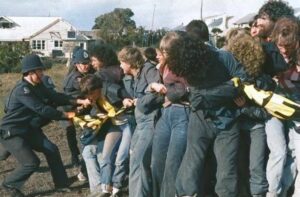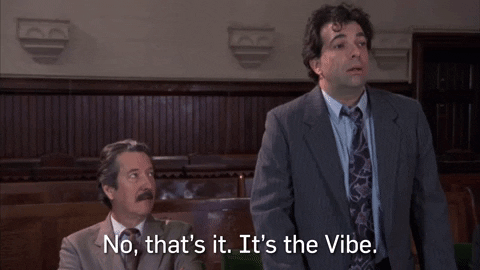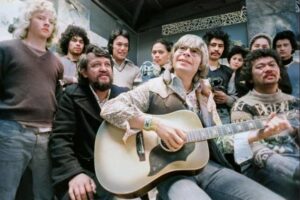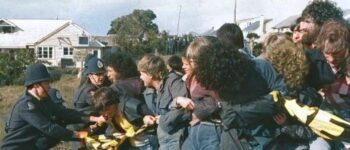1977: Bastion Point
January 5, 2025
By AHNZ
 The Bastion Point occupation got underway today in New Zealand history, 5 January 1977. After many warnings and deadlines ignored, The State finally put a stop to this major protest after 506 days; it ended on 25 May 1978.
The Bastion Point occupation got underway today in New Zealand history, 5 January 1977. After many warnings and deadlines ignored, The State finally put a stop to this major protest after 506 days; it ended on 25 May 1978.
Representatives of the Ngati Whatua were not happy about their ancestral leaders selling the land to the Government. This had been going on since 1868. Indeed, since 1840 when Ngati Whatua tribesmen first regained their old territory of Auckland by forming an alliance with William Hobson. Ref. 1840: Purchase of Auckland, AHNZ
In 1976 National 3.0 resolved to develop the land as parks, state houses, and Maori housing and a marae. On 27 February 1978 a generous settlement was agreed to between National 3.0 and the tribal elders. A new Ngati Whatua Trust Board would be filled up with money and vested with the land, including existing state houses on the site. It looked like everyone with authority and responsibility was happy to go ahead right up until two days before construction of the housing was to start. But, then, the energetic young Boomers made a belated play for power. Some of the land would go to private buyers but the protesters wanted that for themselves too. The Boomer Truth Regime was underway and greatly at odds with the polity and historical understanding of New Zealanders up until this point.
As with the Ihumatao Occupation (2019) the young protesters did not respect the wishes of their elders. Their protest lasted about a year and a half!
A ramshackle encampment was set up under the leadership of Joe Hawke who had broken with his family’s wishes for Bastion Point. He was at middle-age, patient and, unlike most Boomer Maoris, could speak the Maori language. His right-hand women and shadow-writer Diane Prince says “keeping clean was a truly difficult business” in the camp. Gumboots (for the mud) and basic garb was the order of the day. The Treaty of Waitangi was a “fraud” still back then, the innovation that it was good for Maoris and ought to be “honoured” yet to be pioneered. “Maoris” still used New Zealand English plurals and “Aotearoa” yet to be substituted in place of New Zealand. Nor was the principle of ‘tangata whenua’ yet dreamed up and established according to Prince. So, protesters squabbled over who held hegemony over this political cause and the hoped-for rewards.
“Some people felt that their descent lines were higher and therefore they were better equipped to lead the take. Now, of course, it’s an accepted thing that land take are shaped and led by tangata whenua and everybody comes in to support them.” – Diane Prince, E-Tangata (2023)
“The Maori elders’ group involved in the Bastion Point land issue remained resolutely opposed to the militants last evening, and it now seems almost certain that two of the protesters’ leaders will go to jail…said that further contact with the protesters was useless because of their attitude and lack of respect, and it asked the Prime Minister to act expeditiously on the matter.” – Press (6 May 1978,) Papers Past
Hawke “backed away from the hardline demand that the whole of Bastion Point be returned to the Maoris….The existing proposal is that 25 acres be vested in a new Ngati Whatua trust board, that 30 acres additional to the existing 117 acres be vested in the Auckland City Council as a reserve, and that four acres be used for medium-density, low-cost community housing.” – ibid
“We were there Will Ilolahia Wynn the Hawke whanau, Ngati Whatua Polynesian Panthers, NgaTamatoa, Dilworth Karaka and over 200 others.” – Coconut Grove KRD comment to AHNZ (2024)
“Moana Jackson says Ihumātao represents a ‘crystallising’…While some may go to those places for their own reasons,…Ihumātao…the foreshore and seabed, Raglan, Bastion Point – they illustrate that…people may not necessarily know all the history, they may have a jaundice or misunderstood view of the history, but they recognise an injustice,” – Ihumātao – ‘Don’t forget, the Crown caused this problem’, Moana Jackson; RNZ (2019)
“Now imagine that the society is suddenly hit by a Great Event (what Karl Mannheim called a “crystallizing moment”), some sort of emergency so fraught with social consequence that it transforms all of society’s members, yet transforms them differently according to their phase-of-life responses.” – The Fourth Turning: William Strauss and Neil Howe (2009)
As Maori lawyer Moana Jackson observed, Bastion Point and other similar outbursts are crystallising moments. Bastion Point is an example of a social event that marked New Zealanders’ world view differently depending on who they were and what generation they belonged to. Applying the Strauss-Howe history theory to New Zealand this was an expression of Baby Boomers during the final months of an Awakening time. AHNZ identifies it as the Nambassa Second Turning (1957-1978) time period. Other Awakening/Second Turning points of focus at the time was the Maruia Declaration (anti-logging) and Abortion (antenatal.)
 Jackson also conceded that those crystalised by Bastion Point were involved for their own reasons that didn’t involve clear perception or an understanding grasp of their own history. But the key thing was that they loosely shared the same sentiments about injustice. As another lawyer, Dennis Denuto in The Castle (1997,) said it even better in his own scatter-shot legal pleading: “It’s the constitution, it’s Mabo, it’s justice, it’s law, it’s the vibe!” If they didn’t get to know each other too well they could mistake one another’s views as a consensus and form a group. New Zealand history is full of groups like this made powerful by Intersectionism that decays into Fracturing and Purity Spiral when members finally get to know each other. A good leader has to try to stop this from happening for as long as they can.
Jackson also conceded that those crystalised by Bastion Point were involved for their own reasons that didn’t involve clear perception or an understanding grasp of their own history. But the key thing was that they loosely shared the same sentiments about injustice. As another lawyer, Dennis Denuto in The Castle (1997,) said it even better in his own scatter-shot legal pleading: “It’s the constitution, it’s Mabo, it’s justice, it’s law, it’s the vibe!” If they didn’t get to know each other too well they could mistake one another’s views as a consensus and form a group. New Zealand history is full of groups like this made powerful by Intersectionism that decays into Fracturing and Purity Spiral when members finally get to know each other. A good leader has to try to stop this from happening for as long as they can.
Joe Hawke’s 1977 Bastion Point group was already a Fractured sub-group of Whina Cooper’s even larger 1975 Land March group. Cooper had travelled widely, keeping her true agenda secret, telling various groups what each ‘needed’ to hear to join her March. She spooked some impressionable audiences into supporting her by telling them they would become landless slaves. She embraced dissatisfied malcontents of various kinds, some with psychological disorders, and made them into fuel for her political rocket ship. Dejected, many of them joined Joe’s camp. Ref. 1975: Unnecessary Land March, AHNZ
“In spite of the eleventh hour pleadings of three Maori elders, the Bastion Point protesters have decided to remain on the disputed land and be removed by the police….Mrs Whina Cooper, Mr Bill Court, and Mr Morgan Puru — met about 150 people at Bastion Point yesterday. Mr Rameka said Mrs Cooper told the meeting she did not want to see anyone hurt. She suggested the protesters walk off the land with her, rather than have a confrontation with the police.” – Press (1978,) Papers Past
“Ngati Whatua trustees of the 700-acre Orakei Block…and their descendants had the right to sell the block, and the Crown set about buying it from them. By 1928 it had acquired all but three acres,,,,included the Orakei community’s church and cemetery. The Ngati Whatua had given this land to the Church of England in 1858 and the Church had sold it in 1926.” – King (1983)
“When protesters were taken off Bastion Pt the majority were Europeans, not Maoris,..” – Winston Peters, Christchurch Star (1985,) p64 Shadows Over New Zealand, Geoff McDonald (1985)

It’s not entirely clear how many of the Bastion Point supporters were local Maoris or even Maoris at all. By the end the majority were White Saviours come to “help.”
“Throughout all the hui, there would be the interplay of different whakaaro. There were socialists, communists, atheists, Christians, nationalists, vegetarians, human rights activists, singers, actors, writers, housewives, farmers, doctors — all kinds of people. ” – Ref. E-Tangata (2023)
These would be people of the same mentality who instigated the violent Springbok Tour Riots of 1981. Communists, Socialists, Vegetarians etc.
Even when international Country Music superstar John Denver paid at Western Springs he made sure to visit Bastion Point the day before (image, left.)
I suspect that many of the Bastion Point images we are allowed to see in State History have been curated to make it look more Maori than it was. Even so, many images show some or even a majority of white folks involved. Some were there, others sent material support. It’s no different in the 2020s where people like Rebecca Sinclair of the Pakeha Project give away food, water, and electronic consumer goods to those who show up. William Hobson did the same thing in the 1840s with blankets, tobacco, and food to get people to sign his Treaty. Ref. AHNZ (Nov 2024)
Think about it though. Were Ngati Whatua’s youthful splinter-protesters really interested in Tim Shadbolt’s politics? Or the Topp Twins’ version of alpine European folk yodelling? Or John Denver’s Appalachian Country and Western white-man licks? These, and many others, kept up their appearances at Bastion. My very strong suspicion is that they were really there because Bastion Point was the cause celebre. The Current Thing. Moana Jackson’s Crystalising Moment that mattered much more as a symbol than it did as anything that made actual sense morally or economically.
Speaking of cost, according to those there the protests left children without their parents. Protesters who had jobs neglected them and even lost them. The worst case was that one of the Hawke children, aged just 5, was burned alive in a tent of the squatters camp. History was repeating. These were the same examples of suffering and disease that provoked leaders to stop issuing warnings and finally, peacefully, break up the squatters at Parihaka in the 1881. Ref. 1881: Bloodless End to the Affair at Parihaka, AHNZ
“My children needed a father and a mother, but Michael was too busy on Bastion Point and didn’t have any time with the family. There was nobody at home for them. I had to work all the time. I think they missed the family atmosphere we had before the occupation of the Point. We were always with them. The Point changed all that…I feel sorry for all the mothers with children who were on Bastion Point. People like Rachel and Rene. Some of my kids had grown up and were older. It was harder for those who had young ones at an age where they needed both parents. ” – Remembering Bastion Point, E-Tangata (2023)
“…my brother-in-law, was deep in with the kaupapa and he wouldn’t waver from it…he took his own life. He didn’t have anybody.” – ibid
Finally, on 25 May, 1978, 600 police backed up by the army invaded the little village and evicted the occupiers. Whina Cooper and other elders wanted Prime Minister Robert Muldoon to take this action, sick of being disrespected. Many stayed to be symbolically arrested but were soon let go because the court system couldn’t process the load.
In the aftermath Bastion Point was left to dangerous pack-hunting feral dog packs. Probably the abandoned pets of Joe Hawke’s squatters who didn’t care about them, agreed the Orakei marae chairman. Ref. Press (1979,) Papers Past
This, of course, is the Anarchist History of the Bastion Point Occupation. While these facts are all easy to find putting them together in this arrangement is not the narrative of State historians. Nor will students pass government history exams if they repeat anything learned in this article!
—
Image ref. Protestors enveloped in banner, Gil Hanly, Auckland Museum. AHNZ colour (2025)
Image ref. Protestors enveloped in banner part 2, Gil Hanly, Auckland Museum. AHNZ colour (2025)
Image ref. John Denver and Joe Hawke at Bastion Point. Trevor Coppock, Auckland Star (15 Nov 1977,) AHNZ colour (2025)
Ref. Past Events, John Denver.com
Ref. Biography of Whina Cooper, Michael King (1983)
2 thoughts on "1977: Bastion Point"
Leave a Reply
 Like Comment Share
Like Comment Share






I was a Cab driver during all of this, paying off a short term mortgage to buy our home so working long hours. Bastion pt was a non event for most people who backed the eviction if pressed. Eden park was a different matter, we wanted that game to be played and at “grass levels” the Police were fully backed. Taxis were used by everyone at the time and were much cheaper than now, is my perception. All afternoon the Downtown Taxi rank was flat out with fares waiting to be picked up to see the Rugby. My last job to the game were four young Maori male age 15 – 18 years. My greeting was” Gidday and where are you off to” Eden park one replied, I said something such as, it will be a cracker game and the one in the front seat replied, “We’re going to have a go at the Cops.” They were well behaved but tense and quiet on the trip to drop off near Eden Park.
Sheesh. First World Problems. How many violent protesters in history get a chariot to the scene of their agitation?